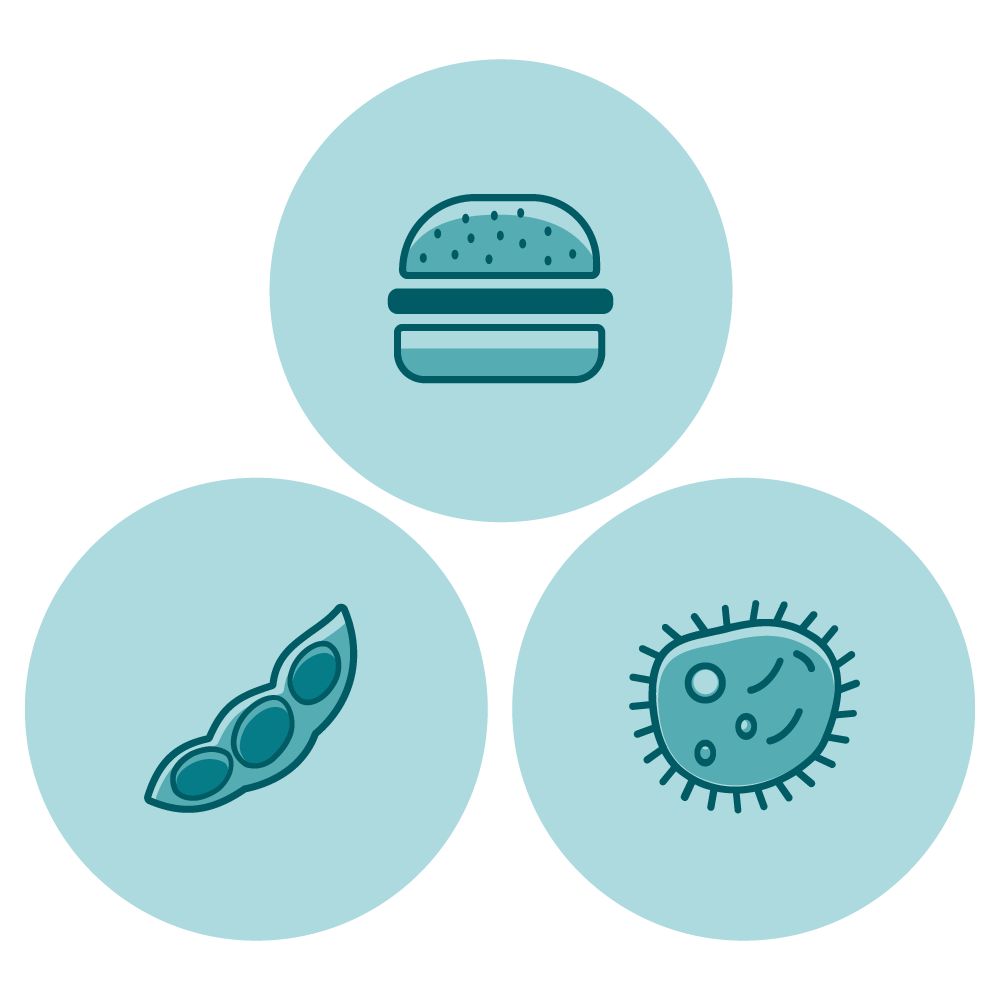
Alternative protein teaching library
Our library of open-access course materials holds syllabi, slide decks, recorded lectures, and recommended readings from alternative protein courses around the globe. Instructors can adapt and transform these materials to design new education and training programs.
Browse featured alternative protein course materials
We recognize designing courses from scratch can be time-consuming for busy educators. To help, we created a library of curriculum materials from up-and-running alternative protein courses. Check out these examples of online courses, undergraduate- and graduate-level university courses, modules, and syllabi. Visit the how-to section for guidance on how to get the most out of this resource.

Build your syllabus
Want to develop a course on alternative proteins but need help figuring out where to start? Get started with these example syllabi from university programs and online courses. You can also use our course syllabus template.
Explore materials from graduate-level university courses
Project-based courses can be a launching pad for students to enter the alternative protein industry. That’s why GFI Israel, GFI India, and GFI APAC developed an advanced curriculum that centers around a student research project. Since 2020, this course has been taught at multiple universities across Israel and Singapore.





View lab protocols from undergraduate-level university courses
By creating flagship alternative protein courses, instructors position their universities to attract top talent increasingly interested in alternative proteins. For example, Tufts University offers multiple courses on cellular agriculture, mostly focused on the bioengineering behind cultivated meat. This featured course helps students gain laboratory experience in cell culture and biomaterials processing.

Watch video modules on cultivated meat science
The Knowledge Society (TKS) is a World Economic Forum-backed community of the world’s most ambitious young people who want to make an impact using emerging technologies and sciences. GFI partnered with TKS to develop video modules on the basics of cultivated meat science. Instructors can integrate these videos into biology, chemistry, food science, material science, and tissue engineering courses.

Adapt slides and recorded lectures from GFI’s online course
Our open-access online course, The Protein Transition, explores the science behind alternative proteins. This introductory-level course covers three production platforms: plant-based, fermentation, and cultivated. Feel free to use these materials as the building blocks for your alternative protein course.

Explore all teaching materials
Browse the entire library, sorted by alternative protein production platforms: plant-based, cultivated, and fermentation. Filtering options include resource type, university or organization, instructor, technology area, discipline, level, and more. Check out the how-to section for guidance on how to get the most out of this resource.

Search the library
View all plant-based meat, eggs, and dairy materials
Plant-based meat uses plant-derived ingredients to mimic conventionally produced meat’s taste, texture, and nutrition.
View all cultivated meat materials
Cultivated meat, also known as cultured meat, is genuine animal meat (including seafood and organ meats) that is produced by cultivating animal cells directly.
View all fermentation materials
Fermentation uses microorganisms to improve the properties of alternative protein ingredients, to create specific high-value ingredients, or directly as a protein source in alternative protein products.
The future of alternative protein education
To ensure a robust talent pool for the alternative protein industry, we need more university programs like the Certificate in Cellular Agriculture at Tufts University and the Protein Diversification focus area within EIT Food’s Master in Food Systems program. Program requirements would include courses from food science and other key disciplines for alternative proteins and electives providing historical, economic, and societal context for food technology. An alternative protein “track” could be nested within an existing biotechnology or food science program. Complete majors might focus on one of the leading production platforms: plant-based meat, cultivated meat, and fermentation. Look at the proposed programs below to see which alternative protein pillars align best with your university’s disciplinary strengths.

Requirements for an alternative protein track
A track or specialization is a curated cluster of courses within an existing degree program (e.g., biotechnology, food science). Alternative protein tracks may include classes from key disciplines and 1-3 dedicated alternative protein courses.
Here’s how we envision an alternative protein track within an undergraduate biotechnology major.
Preparatory requirements for biotechnology major
Biology
General chemistry
Organic chemistry
Calculus
Physics
Statistics
Intro to biotechnology
Specialized requirements for biotechnology major
Gene expression
Cell biology
Biomolecules & metabolism
Ethics in biotechnology
Microbiology
Molecular biology
Alternative protein track requirements
(choose 7 courses)
General options
Intro to alternative proteins (required)
Genetics and biotechnology lab
Functional genomics
Food microbiology lab
Food processing
Bioprocess engineering lab
Plant-based options
Principles of plant biotechnology
Plant biochemistry
Plant genetics
Plant breeding
Evolution of crop plants
Cultivated options
Recombinant DNA cloning & analysis
Tissue engineering
Systemic physiology
Biomaterials
Protein engineering
Fermentation options
Recombinant DNA cloning & analysis
Yeast molecular genetics
Fermented foods
Microbial diversity
Requirements for a plant-based meat major
The potential for plant-based meat expertise is associated with solid departments of agricultural science, biological science, food science, and engineering.
Preparatory core requirements
Biology
General chemistry
Organic chemistry
Calculus
Physics
Statistics
Intro to food science & technology
Intro to plant-based meat
Specialized core requirements
Biochemistry
Molecular biology
Plant biology or botany
Agronomy or horticulture
Food chemistry and analysis
Food processing
Food sensory
Food safety
Meat science
Electives
Plant genetics and breeding
Historical geography of crop plants
Biology of macromolecules
Process chemistry & engineering
Cell biology
Food microbiology
Materials science
Biomaterials characterization lab
Food product design
Computer science
Nutrition
Business/economics
Marketing
Food packaging
Anthropology of food
Psychology
Culinary science
Food laws and regulations
Requirements for a cultivated meat major
The potential for cultivated meat expertise is associated with a university with strong departments of chemical engineering, biological science, food science, stem cell biology, tissue engineering, and materials science.
Preparatory core requirements
Biology
General chemistry
Organic chemistry
Calculus
Physics
Statistics
Bioengineering fundamentals
Intro to food science & technology
Intro to cultivated meat
Specialized core requirements
Biochemistry
Cell biology
Molecular biology
Meat science
Tissue engineering fundamentals
Product development
Bioprocess development
Bioprocess engineering
Biological reactor design
Food sensory
Safety and regulation (for both food and pharma)
Electives
Environmental science
Life cycle assessment (LCA) fundamentals
Energy infrastructure and the environment
Marine biology/Marine science
Food science
Protein engineering
Genetic engineering
Principles of synthetic biology
Materials science
Heat and mass transfer
Fluid dynamics
Hydraulic transport in biological systems
Heat and mass transport in biosystems engineering
Process simulation
Modeling for systems biology
Food product design
Computer science (esp. courses related to automation)
Nutrition
Business/economics
Marketing
Requirements for a fermentation major
The potential for fermentation expertise is associated with a university with strong departments of microbiology, chemical engineering, bioengineering, and food science.
Preparatory core requirements
Biology
General chemistry
Organic chemistry
Calculus
Physics
Statistics
Intro to food science & technology
Intro to fermentation
Specialized core requirements
Microbiology
Biochemistry
Synthetic biology
Product development
Bioprocess development
Industrial fermentation
Food mycology/microbiology
Food processing
Food sensory
Food safety and quality
Electives
Microbial genetics/molecular biology
Genetic engineering
Recombinant protein production
Biological thermodynamics
Transport phenomena in biological systems
Instrumental analysis lab
Food product design
Computer science
Nutrition
Business/economics
Marketing

Alt Protein Pipelines webinar series
The Alternative Protein Pipelines webinar series is our forum to provide roadmaps for success to anyone interested in alternative protein education and training. Each presentation will give you some actionable steps, whether you want to find an entry point into the alternative protein ecosystem or build one yourself.
How to use the teaching library
Filter: You can filter the teaching library by alternative protein production platform, technology area, discipline, resource type, university or organization, instructor, level, and more. You can also download the database as a CSV file.
Adapt: Use the materials in our library as building blocks for your alternative protein course, module, or other educational program. All featured resources are open-access, ready for educators to adapt them.
Cite: Please cite any materials used in building your alternative protein curriculum. The materials in our library are licensed under Creative Commons BY 4.0. This means you must give appropriate credit, provide a link to the license, and indicate if changes were made. For example: “This lecture was adapted from ‘Cellular Agriculture 101’ by the David Kaplan group at Tufts University, used under CC BY 4.0.” Read more about best practices for attributing CC-licensed materials.
Submit: For this resource to have the highest impact, we need your help filling in the gaps. A comprehensive library would contain course materials for all alternative protein production platforms—plant-based, cultivated, and fermentation-derived—and for an audience varying in academic levels, learning styles, and preferred languages. Contribute your educational materials using the form below.
Submit your materials
Once you have created your alternative protein curriculum, we encourage you to add your adapted materials to our curriculum repository. As a curriculum developer, you play a vital role in accelerating the development of alternative protein by creating much-needed educational content. Expand the impact of your work beyond your classroom by empowering educators worldwide to adapt your materials to their academic institutions.

"*" indicates required fields

Resource
Join the alt protein educator community
Join our alternative protein educator community and help bring alternative protein education into classrooms around the globe.
Contact us
If you want help building your alternative protein education or training program, don’t hesitate to contact our team. We’d love to help!
Learn more about education and training needs
To accelerate progress in the alternative protein field, we need to widen the talent pool of scientists, engineers, and entrepreneurs. Learn more about education and training needs below.
